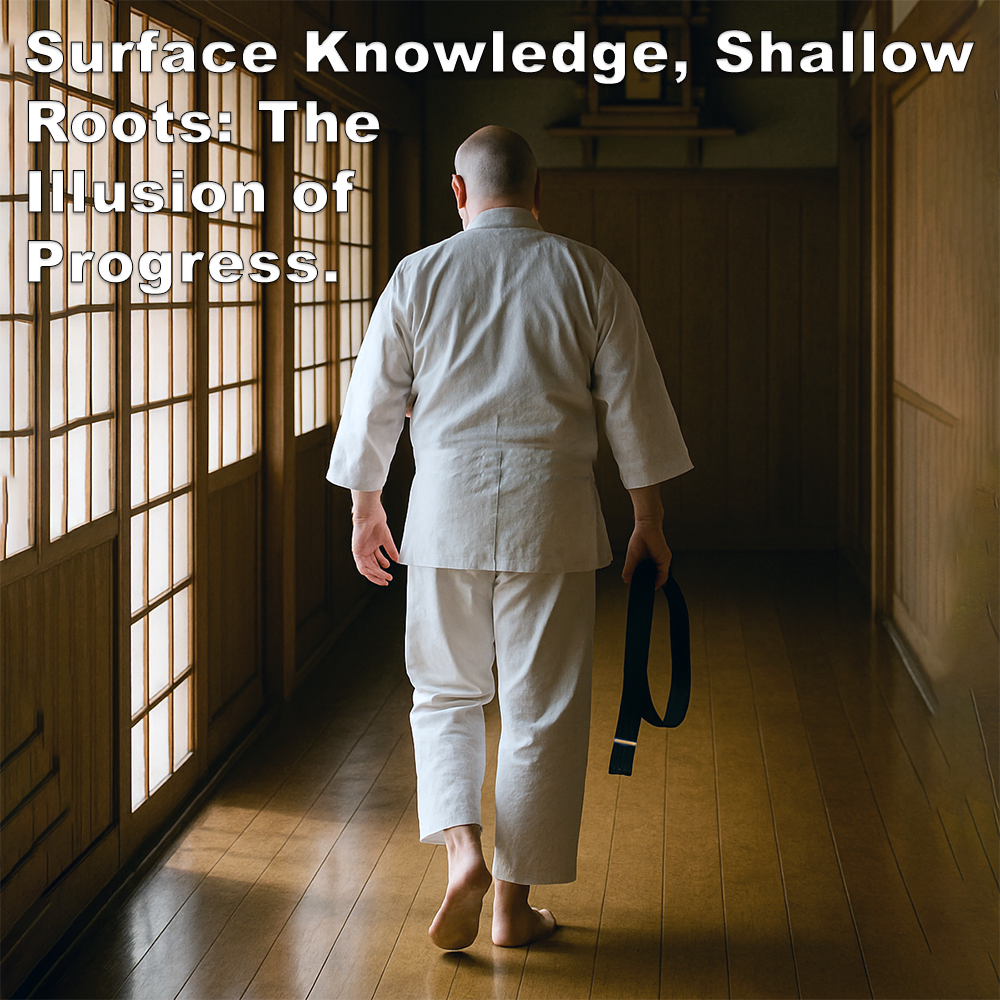
(Approx 2 minute 55 second read)
For many, earning a dan grade is the pinnacle of their journey. It feels like a mountain climbed – years of effort, sweat, and achievement wrapped up in a black belt and a certificate. And for a time, that feeling is enough.
.
After the novelty of the belt wears off, some students start to feel a change. They begin to see things differently. Techniques that once seemed simple become more complicated. Something doesn’t feel quite right. Kata – start to feel more like puzzles. Questions emerge. Doubt creeps in.
.
This is where the real journey begins. And this is where many stop.
.
Not that long ago, we had a father and two sons, all 1st kyu’s. They were being prepared for shodan in a few months time, and one particular lesson where I demonstrated a principle – they looked at each other and said they still have a lot to learn.
.
A few days later I received a text message. They quit. They had reached a threshold – not the summit.
.
The 1st dan isn’t mastery. It’s a sign that you’ve built a solid foundation, solid enough to start looking deeper. And that can be hard to accept after years of working toward something that, in the end, turns out to be just the beginning.
.
At this stage, progress isn’t about collecting more techniques. It’s about depth. It’s about understanding what’s behind the movement – why it works, when it doesn’t, and how context changes everything. It’s about becoming comfortable with uncertainty, because deeper knowledge always brings more questions than answers.
.
It takes a certain kind of person to step through that door. Someone willing to set aside ego and look at what they don’t know. Someone willing to move past just practicing and instead live it, carry it, let it change them quietly over time.
.
Most people, even the dedicated ones, don’t go that far. And I don’t say that as a criticism. Life is full, and karate isn’t everything to everyone. But it does mean that when a student reaches this point – and chooses to keep going, it stands out.
.
Over the years, I’ve had a few who looked like they might go that far. Talented, committed, thoughtful.
.
But something changed along the way. Maybe they caught a glimpse of what was ahead – the level of thinking, the level of responsibility – and decided it was too much. Not because they weren’t capable, but because they knew that walking further would ask more of them than they were ready to give. And that’s honest. That’s real.
.
Karate doesn’t change people just because they show up. You can offer the lessons, but whether they take root is up to them. People are who they are. You provide the material. The rest is their choice.
.
But for the rare ones who do continue – for those who take that next step – the art begins to reveal itself in ways that can’t be explained. It shows up in how they move, how they listen, how they handle pressure. It shows up in how they live.
.
That’s the real value of this practice. Not the belt. Not the grade. But the person who keeps going after those things lose their shine.
.
A kyokushin shodan recently challenged my views on kata, in relation to its role in combat training. He hadn’t gone beyond the surface – he saw kata as choreography, not as a repository of principle or combative insight. And when he couldn’t see past what he already thought he knew, he moved on, a different style. Earned another grade. Then stopped again. Now he coaches in a gym.
.
He’s not alone. It’s a common story – people mistaking early achievements for deep understanding, collecting ranks across systems without ever truly absorbing one. What they’re left with is surface knowledge – a patchwork of exposure, but no substance.
.
This is the difference between just repetition or letting it shape you. One fades over time. The other deepens.
.
If you’re one of those who’ve reached that edge – and it feels unfamiliar, even uncomfortable – don’t back away too quickly. That feeling might mean you’re finally ready to understand.
.
.
Written by Adam Carter
